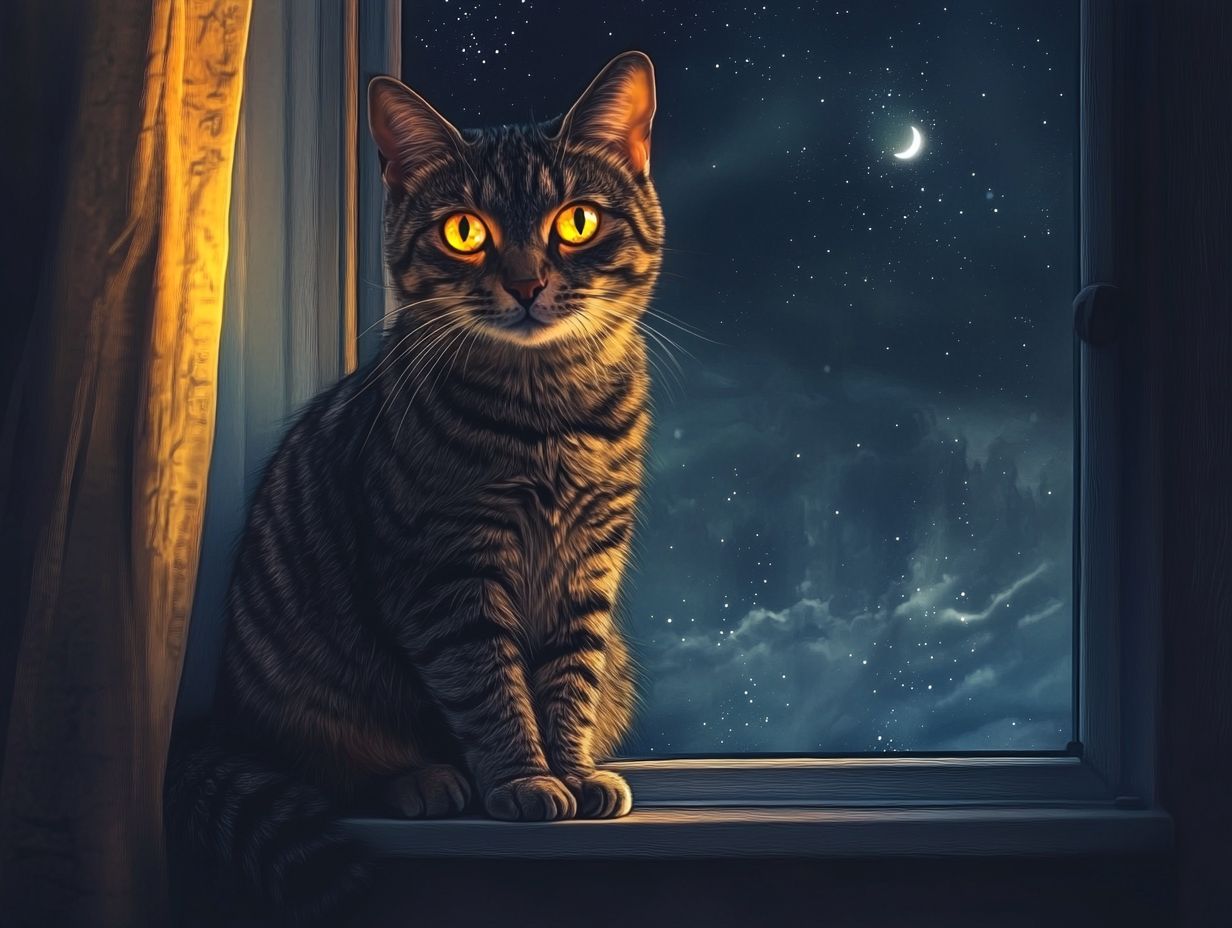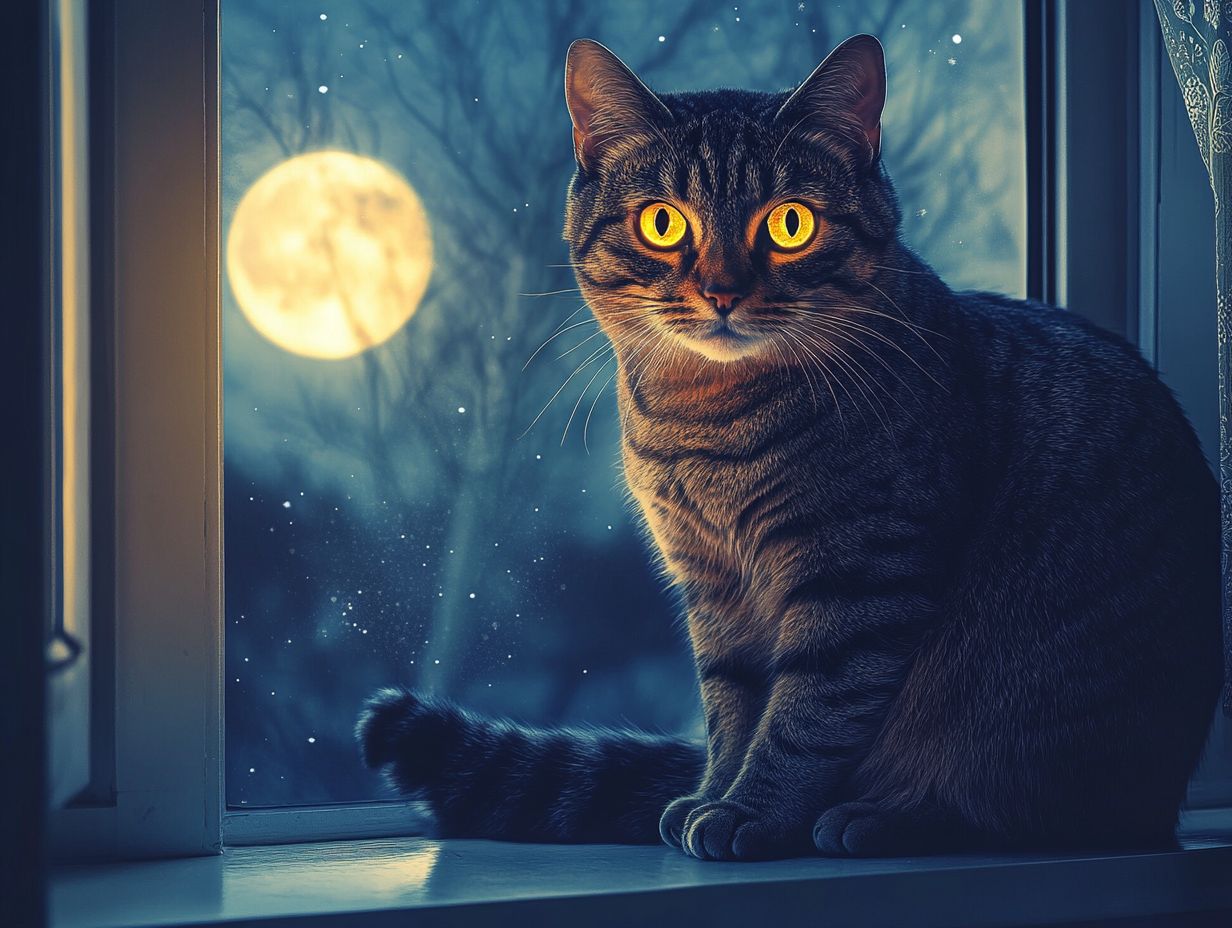If you’re a cat owner, you may have experienced the peculiar phenomenon of your feline friend cat meowing at night. This nocturnal behavior can be puzzling and often disruptive. Understanding these behaviors from the cat’s perspective is essential, as their natural instincts and activity patterns play a significant role in their nighttime vocalizations.
But why do cats vocalize during these late hours? From cat attention seeking to potential cat health issues, there are several cat meowing reasons behind this nighttime chorus. Environmental factors such as changes in routine or home setup can also influence these behaviors.
We will explore the various motivations for those midnight meows, distinguishing between behaviors in kittens, adults, and senior cats, while providing practical tips to help minimize this behavior, ensuring peaceful nights for both you and your furry companion.
Understanding cat behaviours and feline instincts can lead to effective meowing solutions. Additionally, recognizing individual variations among breeds and personal experiences can help tailor approaches to each cat’s needs.
Key Takeaways:

Why Do Cats Meow at Night?
Cats meow at night for various reasons, often tied to their natural instincts and specific behavioral patterns. Recognizing these causes can help cat owners manage nighttime meowing, which can be stressful for both the pet and the owner. Common myths surrounding this behavior can obscure the real causes.
Factors such as boredom, attention-seeking behavior, and hunger resulting from an improperly timed cat feeding schedule can contribute to excessive nighttime meowing. Additionally, certain cat breeds may be more predisposed to nocturnal behavior, and underlying cat health issues could worsen sleep disturbances or nighttime interruptions.
1. Attention-Seeking Behavior
Attention-seeking behavior is a common reason why cats meow at night, as they may crave interaction or playtime before bed. This vocalization often peaks during late hours when owners are winding down, while cats, full of energy, feel the urge to engage with their humans. Using positive reinforcement methods is essential; punishment can negatively impact feline psychology.
Providing ample mental stimulation throughout the day can significantly reduce this nighttime disruption. Interactive toys such as the PURRfect Wild Hemp Cat Toy and puzzle feeders like the Aikiou or Stimulo can help satisfy their natural hunting instincts.
By ensuring that feline companions receive adequate playtime and engagement during the day, owners can minimize those late-night calls for attention. Ultimately, a well-stimulated cat is more likely to enjoy restful nights, reducing boredom in cats and fostering a harmonious coexistence.
2. Hunger or Thirst
One of the most common reasons for nighttime meowing in cats is hunger or thirst resulting from improper feeding schedules or feeding later in the evening. When cats become hungry at night, they may vocalize their needs, disturbing both their own sleep and that of their owners. Establishing a consistent feeding schedule can help align feeding times with their natural rhythms.
By ensuring that feeding times are predictable, cats can feel full for longer periods, significantly reducing nighttime meowing. Additionally, having predictable feeding times can provide cats with a sense of security, further enhancing both their sleep and yours.
3. Medical Issues
Cat health issues can also contribute to nighttime meowing, particularly in older cats who may experience conditions such as Cognitive Dysfunction Syndrome, thyroid issues, arthritis, kidney problems, or diabetes. These medical conditions can cause discomfort, confusion, or pain, leading to increased vocalization as the cats seek attention or relief.
For example, cats with hyperthyroidism may become restless and vocalize excessively during odd hours due to their heightened energy levels. Similarly, cognitive dysfunction syndrome can disrupt a cat’s sleep-wake cycle, resulting in nocturnal meowing that may indicate distress or disorientation.
Regular veterinary check-ups, possibly utilizing resources like BCP Veterinary Pharmacy, are essential for early identification of these potential health issues, enabling timely interventions that can enhance not only the cat’s quality of life but also the tranquility of the household.
4. Aging
As cats age, vocalization patterns can change significantly. Older cats might vocalize more due to cognitive decline or discomfort from health issues. Understanding these age-related changes is crucial for managing their behaviors effectively.
Recognizing signs of stress and anxiety in cats specifically related to nighttime behaviors is essential. Providing a calm environment, engaging in gentle interaction, and ensuring their comfort can significantly reduce vocalization.
It’s important to educate cat owners on the connection between behavior and health and to encourage ongoing learning about feline behavior through resources such as veterinary journals or webinars.

Aging in cats can lead to behavioral changes, such as increased nighttime meowing, often a sign of cognitive dysfunction syndrome (CDS). Research published in veterinary journals indicates that this syndrome is more common in senior cats and typically manifests as confusion, disorientation, and alterations in sleep cycles that disrupt the rest of both the feline and their human companions.
Signs that an aging cat may be experiencing cognitive decline include wandering at night, forgetting their owners or familiar locations, and losing track of the litter box. Maintaining litterbox cleanliness is crucial to support their emotional well-being. These behavioral changes may be exacerbated by age-related sleep fragmentation, causing cats to become restless at night when their owners wish to sleep.
Cat owners should adopt a holistic approach, emphasizing that aging affects not only physical health but also emotional well-being. Changes in a cat’s environment, such as new household arrangements, can significantly influence their behavior. Being vigilant about these changes can help owners manage them with the assistance of a veterinarian.
5. Separation Anxiety
Separation anxiety can cause cats to meow at night, especially in breeds more prone to attachment and stress when left alone. This condition often results in nighttime vocalizations, creating frustration for both the feline and their human companions. Individual responses can vary by breed, genetics, and experiences that contribute to anxiety.
Breeds such as Siamese, Ragdolls, and Burmese form particularly strong bonds with their owners, making them more susceptible to feelings of loneliness and fear during the night. To mitigate this troubling behavior, it’s essential to create a calming nighttime environment. Strategies such as:
- Providing a cozy bed
- Using calming pheromones
- Ensuring an abundance of toys
- Incorporating soothing sounds
can help ease their anxiety. Additionally, regular playtime before bed can tire them out, promoting a peaceful night’s sleep.
6. Hormonal Changes
Hormonal changes can lead to increased nighttime meowing in cats, especially during mating seasons or due to underlying health issues. These fluctuations can cause stress or restlessness in felines, prompting them to vocalize their discomfort or desire to mate. It is crucial for owners to closely observe their pets during these times, as hidden health problems may exacerbate these behaviors.
Regular check-ups can help identify any health concerns that could be influencing their nighttime antics. Taking proactive measures, such as spaying or neutering, not only helps manage this vocalization but also contributes to their overall health and well-being, potentially reducing the likelihood of unwanted behaviors.
How To Prevent Your Cat From Meowing at Night?
To reduce a cat’s nighttime meowing, consider implementing strategies such as:
- Providing sufficient exercise and mental stimulation
- Establishing regular feeding schedules
- Making adjustments to the cat’s environment
1. Establish a Routine
Establishing a consistent routine can significantly reduce nighttime meowing by aligning with your cat’s natural internal clock. Regular feeding times, designated play sessions, and relaxation periods before bed foster a sense of security and predictability in your cat’s environment. This routine not only encourages more desirable behavior but also calms the cat, making them less anxious at night.
When these activities occur at the same time each day, your cat will know what to expect, thereby minimizing disturbances during the night. This consistency serves as a calming influence that benefits both pets and their owners.
2. Provide Adequate Mental and Physical Stimulation

Providing mental and physical stimulation throughout the day is essential for keeping cats active and reducing nighttime meowing. A variety of cat toys, such as interactive feather wands, laser pointers, and puzzle feeders, can significantly enhance engagement levels. These toys encourage natural feline hunting behavior, providing the exercise needed to prevent obesity and lethargy.
Additionally, consider enriching your cat’s environment with interactive toys, scratching posts, and safe outdoor access to satisfy their natural instincts. Activities such as climbing on cat trees or playing hide-and-seek with treats help fulfill their environmental needs, keeping cats active and healthy.
It’s important to recognize signs of stress and anxiety in cats, such as changes in body language. Common signals include hiding, excessive grooming, and vocalizations. By observing these behaviors, you can address underlying causes and create a more comfortable environment.
3. Positive Reinforcement and Behavior Modification
Using reward-based training methods to encourage quieter behavior at night is essential. Negative reinforcement can be detrimental, creating an environment of fear. Instead, focus on positive reinforcement techniques that reward your cat for calm behavior, such as offering treats or praise when they remain quiet at night.
In multi-cat households, understand that dynamics among cats can contribute to vocalizations. Proper introductions and resource management, such as multiple litter boxes and feeding stations, can help reduce competition and anxiety.
4. When to Seek Professional Help
Recognizing when to seek veterinary advice for behavioral issues is crucial. Working with veterinarians, behaviorists, or trainers can provide tailored strategies for your cat’s unique situation. Don’t hesitate to consult professionals, especially if you notice sudden changes in behavior or signs of stress.
Further Resources
For ongoing learning, consider exploring books, websites, and workshops that focus on feline behavior. Engaging with these resources can empower you with knowledge to improve your pet’s quality of life and strengthen the human-cat bond.
By stimulating both the mind and body, we can help ensure cats feel secure and engaged, minimizing boredom-related behaviors. This is especially important for older cats, as regular mental activity can help prevent Cognitive Dysfunction Syndrome, contributing to a longer and happier life (source: Journal of Feline Medicine and Surgery).
3. Address Any Medical Issues
Addressing any underlying medical conditions is essential for controlling nighttime meowing and enhancing your cat’s overall health. Regular veterinary check-ups are crucial for the early detection of these issues, including cat health problems like arthritis or Cognitive Dysfunction Syndrome. It’s important to consider both physical health and environmental enrichment to support emotional well-being, as factors such as changes in household dynamics or recent moves can contribute to anxiety.
For instance, excessive vocalization can sometimes indicate anxiety, pain, or age-related cognitive dysfunction syndrome, all of which can significantly disrupt a cat’s ability to settle down at night. Additionally, nighttime behaviors can vary between kittens, adults, and senior cats, with older cats potentially vocalizing more due to cognitive decline.
Proactive pet owners may consider various treatment options, including medications, special diets, or adjustments to the living environment, to alleviate symptoms of cognitive decline. Observing your cat’s responses can help identify the best approach.
By taking these steps, owners can help ensure that their feline companions spend less time meowing at night, ultimately improving their pets’ quality of life and leading to quieter nights for both the pet and the owner.
4. Make Sure Your Cat Is Comfortable
Creating a comfortable nighttime environment can significantly enhance a cat’s sleep quality and reduce nighttime meowing. Consider your cat’s nocturnal behavior and crepuscular activity when making adjustments to their surroundings.
Providing cozy sleeping spots and bedding, such as blankets or cushioned beds, can help them feel more relaxed and secure. Utilizing cat toys like the PURRfect Wild Hemp Cat Toy can also enhance their comfort. It’s also important to ensure that the room temperature is suitable for the specific breed, as some cats thrive in warmer conditions while others prefer a cooler atmosphere.
Additionally, checking the litter box before bedtime is essential to ensure it is clean, as a dirty litter box can cause discomfort and urgency for a cat. Understanding cat meowing reasons and cat behaviours is crucial in addressing these needs effectively.
Comfort preferences and nighttime habits can vary greatly by breed, making it vital to cater to their individual needs. Introducing environmental enrichment like puzzle feeders or interactive toys can help keep cats mentally engaged.
5. Consider Using White Noise or Music
Integrating cat behaviour understanding and playtime before bed routines can further help in minimizing disruptions.
The use of white noise or calming music can effectively mask sounds that may trigger nighttime meowing or sleep disturbances in cats. By creating a consistent auditory environment, these sounds help cats feel more secure and relaxed, reducing their instinctual reactions to unexpected noises and internal hunting clock.
This calming atmosphere can prevent nighttime interruptions and promote deeper sleep cycles for pets, contributing to their overall well-being. Additionally, it facilitates a more harmonious coexistence between the owner and the cat during nighttime hours, making the night more peaceful for everyone involved. Engaging with The Cat Whisperer, Mieshelle Nagelschnider, may offer further insights.
6. Ignore the Meowing Behavior
Understanding cat attention seeking and managing cat feeding schedule before bed can assist in reducing boredom in cats.
One of the most effective ways to stop a cat from meowing at night is to ignore it. Responding to a cat’s nighttime meowing can reinforce the behavior, especially if the cat is seeking attention. Consider adjusting the cat feeding schedule and ensuring feeding later evening to mitigate hunger-related meowing. When pet owners refrain from satisfying their persistent calls, they are likely to notice a change in their pet’s behavior over time.
This approach relies on the understanding that any form of attention, even if negative, can reinforce unwanted behaviors. While ignoring meowing can be effective, it’s also crucial to reward quiet behavior during the night using techniques such as treats or praise. In the long run, the cat may learn that meowing late at night does not elicit the desired response.
While this change may not occur immediately and requires patience, consistent application of this method will eventually create a more peaceful environment with fewer nighttime interruptions and better sleep for everyone involved.
7. Consult with a Veterinarian or Animal Behaviorist

If excessive nighttime meowing persists, it may be a symptom of deeper issues, such as stress or health problems, rather than simply attention-seeking behavior. Clearly defining when the situation warrants seeking help from a veterinarian or animal behaviorist is important. These professionals can provide tailored strategies based on individual cat assessments.
Strengthening the human-cat bond can mitigate nighttime vocalization by ensuring cats feel secure and understood. Owners are encouraged to continue their education on feline behavior through credible resources and books.
Consultation may be required for deeper insights into potential cat health issues and meowing solutions. According to veterinary studies, such as “Cognitive Dysfunction Syndrome in Cats: A Review,” nighttime meowing can often be linked to underlying health conditions.
If nighttime meowing persists despite your efforts to resolve the issue, consulting a veterinarian or animal behaviorist can provide the insights and solutions you and your cat may need. Understanding that meowing behaviors can stem from natural hunting instincts or social needs is crucial. Observing changes in the cat’s environment or routine can also contribute to these behaviors, especially in older cats.
A veterinarian can evaluate your pet’s overall health and determine if issues such as cognitive dysfunction syndrome are contributing factors. For instance, older cats may experience changes in cognitive functioning that adversely affect their nighttime behavior. Exploring products from BCP Veterinary Pharmacy might also be beneficial.
Through thorough assessments, professionals can recommend behavioral interventions and utilize products like Aikiou and Stimulo to tailor to your cat’s specific needs, ensuring a peaceful night for both of you. Additionally, incorporating positive reinforcement techniques can help in modifying any unwanted vocalizations.
Frequently Asked Questions
Why Does My Cat Meow at Night? (And How To Prevent It)
Understanding cat history and feline instincts is crucial in addressing cat meowing. Factors such as breed and individual personality play significant roles in vocalizations, with certain breeds being more prone to it.
There are several reasons why your cat may be meowing at night. Some common reasons include hunger, attention seeking, or disorientation. To prevent this behavior, ensure your cat’s basic needs are met before bedtime and provide them with ample mental and physical stimulation during the day, such as interactive toys and play sessions.
How can I tell if my cat’s meowing at night is due to hunger?
If your cat’s meowing is accompanied by other signs of hunger, such as pacing and looking in their food bowl, it is likely that hunger is the cause. To prevent this behavior, consider adjusting their feeding schedule by providing a larger meal before bedtime or leaving out a small amount of dry food for them to snack on throughout the night.
What should I do if my cat’s nighttime meowing is due to attention seeking?
If your cat is meowing for attention at night, it’s important not to give in to their demands. Instead, try ignoring their meowing and only give them attention when they are quiet. Incorporating more playtime before bed can help alleviate their need for attention, reinforcing that quiet behavior is more effective for gaining your focus.
Could my cat’s nighttime meowing be a sign of a medical issue?
In some cases, excessive meowing at night could be a sign of a medical issue, such as Cognitive Dysfunction Syndrome or hyperthyroidism. If you suspect that this may be the case, it’s important to consult with your veterinarian for proper diagnosis and treatment, as health issues often intertwine closely with behavior.
How can I help my cat feel more comfortable at night?
If your cat is meowing at night due to disorientation or anxiety, consider providing them with a warm and cozy sleeping area, leaving a nightlight on, or playing soothing music to help them relax. Additionally, ensuring litterbox cleanliness is crucial in maintaining comfort.
Should I consider using a deterrent to prevent my cat’s nighttime meowing?
Using deterrents, such as a motion-activated air spray or a white noise machine, can be effective in preventing your cat’s nighttime meowing. However, it’s important to only use deterrents as a last resort and to consult with a veterinarian or animal behaviorist before implementing them. Consider exploring meowing solutions with professional guidance to ensure the best outcomes for your feline friend.